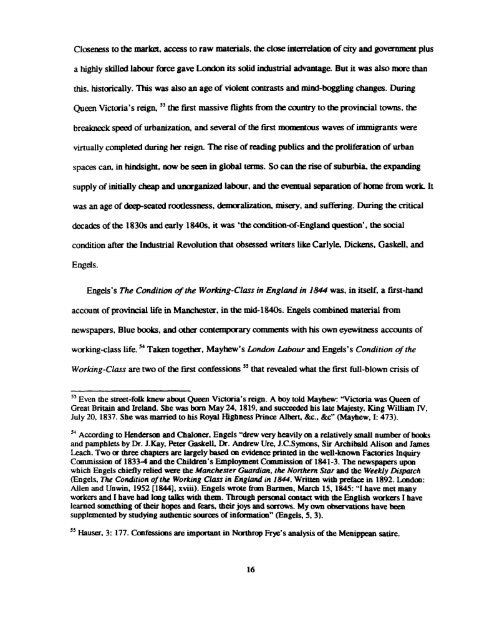You also want an ePaper? Increase the reach of your titles
YUMPU automatically turns print PDFs into web optimized ePapers that Google loves.
Closeness to the market, access to raw materials, the close intarelation of city and govmment plus<br />
a highiy skilled labour force gave London its solid indushial advantage. But it was also mrxe than<br />
this, historically. This was also an age of violent contrasts and mind-bogghg changes. During<br />
Queen Victoria's reign, " the first massive flights from the camtry to the provincial towns. the<br />
breakneck speed of urbanization, and several of the first momerrtous waves of immigrants were<br />
virtually completed during her reign, The rise of reading publics and the proliferatim of urban<br />
spaces can, in hindsight, now be seen in global tams. So can the rise of suburbia, the expanding<br />
supply of initially cheap aad ubotganized labour, and the eve-<br />
separation of home from wak It<br />
was an age of deep-seated rootlessness, denwxalizatioa misery, and suffixing. During the critical<br />
decades of the 1830s and early 1840s. it was 'the condition-of-England question', the social<br />
condition after the Industrial Revolution that obsessed writers like Carlyle, Dickens, Gaskell, and<br />
Engels.<br />
Engels's The Condition of the Working-Class in England in 1844 was, in itself, a first-hand<br />
account of provincial life in Manchestex, in the mid-1840s. Engels combined mataial from<br />
newspapers, Blue books, aad other conteznpaary c0mnxmf.s with his own eyewitness accounts of<br />
working-class life. " Taken together. Mayhew's London Labour and Engels's Condition of the<br />
Working-Class are two of the first confissions " that revealed what the first full-blown crisis of<br />
53 Even the street-folk knew about Queen Victmia's reign. A boy told Mayhew 'Yictaia was Queen of<br />
Great Britain and Ireland. She was ban May 24, 18 19, and succeeded his late Majesty, King William IV,<br />
July 20, 1837. She was married to his Royal Highness Prince Albert, &c., grc" (Mayhew, I: 473).<br />
54 According to Hendersoa and Chaloaer, Engels Vrew very heavily on a relatively small number of ~XIOICS<br />
and pamphlets by Dr. J.Kay, Peter Gaskell, Dr. Andrew Ure, J.C.Symms, Sir Archibald Alison and James<br />
~WI. Two or three chapters are largely besed m evidence printed in the well-known Factmes Inquiry<br />
Commission of 1833-4 and the Children's Employment Ccunmission of 1841-3. The newspapers upon<br />
which Engels chiefly relied were the M~llchcner Guardian, the Nonhem Star and the Weekfy Dispatch<br />
(Engeis, rite Condition of the Working Cks<br />
in Englnnd in 1844. Written with pretaoe in 1892. Loadon:<br />
Ailen and Unwin, 1952 [Isel], xviii). Engels wrote from Barmen, Marcb 15, 1845: "I have met many<br />
workers and I have had long talks with them. Through personal coatact with the Englisb workers I have<br />
learned something of theif hopes and fears their joys and sarows. My own observatims have bem<br />
supplemented by studying authentic sources of information" (Engels, 5.3).<br />
" Hauser, 3: 177. Cmfessims are important in Nathrop Fr)t*s analysis of the Menippean satire.
















